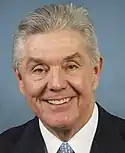Texas's 25th congressional district
Texas's 25th congressional district of the United States House of Representatives stretches from Fort Worth to Austin. The district's current Representative is Roger Williams.
| Texas's 25th congressional district | |||
|---|---|---|---|
.tif.png.webp) Texas's 25th congressional district since January 3, 2013 | |||
| Representative |
| ||
| Distribution |
| ||
| Population (2019) | 818,807[2] | ||
| Median household income | $79,975[3] | ||
| Ethnicity |
| ||
| Cook PVI | R+11[4] | ||
21st century redistrictings
For the 2004 elections, it had an elongated shape stretching from deep south Texas at the U.S.-Mexico border to Austin (informally known as "the fajita strip") as a result of mid-decade 2003 gerrymandering of Texas congressional districts.
The district was redrawn again for the 2006 elections as the result of a lawsuit (see below).
In July 2011, Texas Governor Rick Perry signed into law a redistricting plan ("C185"), approved by the Texas legislature in June, which gave the 25th district a completely different geography for the 2012 elections, including part of Travis County, and stretching north as far as southern Tarrant County near Fort Worth. The redistricting split Travis County into five districts, four of which were heavily Republican. As a result, the only realistic place for Representative Lloyd Doggett to run was the new 35th district (which by weight of population is more of a San Antonio district than an Austin district).
For a number of years, there was a consolidated lawsuit against the redistricting.[5][6] In March 2017, a panel of federal judges ruled that the new 35th district and two others were illegally drawn with discriminatory intent.[7] However, the district was allowed to stand in the Supreme Court's 2018 Abbott v. Perez ruling.
List of members representing the district
| Member | Party | Years | Cong ress |
Electoral history |
|---|---|---|---|---|
| District created January 3, 1983 | ||||
 Michael A. Andrews |
Democratic | January 3, 1983 – January 3, 1995 |
98th 99th 100th 101st 102nd 103rd |
[data unknown/missing] |
 Ken Bentsen Jr. |
Democratic | January 3, 1995 – January 3, 2003 |
104th 105th 106th 107th |
[data unknown/missing] |
 Chris Bell |
Democratic | January 3, 2003 – January 3, 2005 |
108th | [data unknown/missing] Redistricted to the 9th district and lost renomination. |
 Lloyd Doggett |
Democratic | January 3, 2005 – January 3, 2013 |
109th 110th 111th 112th |
Redistricted from the 10th district. Redistricted to the 35th district. |
 Roger Williams |
Republican | January 3, 2013 – Present |
113th 114th 115th 116th 117th |
[data unknown/missing] |
Recent elections
2004 election results
| Party | Candidate | Votes | % | ±% | |
|---|---|---|---|---|---|
| Democratic | Lloyd Doggett | 108,309 | 67.6 | +12.9 | |
| Republican | Rebecca Klein | 49,252 | 30.7 | -12.4 | |
| Libertarian | James Werner | 2,656 | 1.7 | +0.7 | |
| Majority | 59,057 | 36.9 | |||
| Turnout | 160,217 | ||||
| Democratic hold | Swing | +12.6 | |||
2006 election
On June 28, 2006, the U.S. Supreme Court declared that the Texas legislature's 2003 redistricting plan violated the Voting Rights Act in the case of the 23rd district. The main basis for the ruling was that the old 23rd was a protected majority-Hispanic district—in other words, if the 23rd was redrawn in a way to put Hispanics in a minority, a new majority-Hispanic district had to be created. Since the 25th was not compact enough to be an acceptable replacement, the 23rd had to be struck down. The size of the 23rd required the redrawing of nearly every district from El Paso to San Antonio.
As a result, on August 4, 2006, a three-judge panel announced replacement district boundaries for 2006 election for the 23rd district, as well as for the 15th, 21st, 25th and 28th districts. On election day in November, these five districts held open primaries; if any candidate received over 50%, they were elected. Otherwise, a runoff election in December decided the seat.[8]
The redrawn 25th was more compact and restricted to Central Texas, comprising more of Travis County, most of Bastrop County, and all of Hays, Caldwell, Fayette, Gonzales, Lavaca, and Colorado Counties.
Incumbent congressman Doggett faced Republican Grant Rostig (formerly the Libertarian nominee), independent candidate Brian Parrett, and Libertarian Party Barbara Cunningham, and won re-election.
2008 election
In the 2008 election Doggett faced Republican George Morovich, a structural engineer from La Grange and Libertarian Jim Stutsman, a retired Army veteran. Doggett won with 65.8% of the vote to Morovich's 30.5% and Stutsman's 3.7%. Doggett won 73.8% of the vote in his Austin-based stronghold of Travis County.
2010 election
Dogget faced Republican and "Tea Party favorite" Donna Campbell, and again held his seat, though by a surprisingly small margin.[9]
| Party | Candidate | Votes | % | ±% | |
|---|---|---|---|---|---|
| Democratic | Lloyd Doggett (incumbent) | 99,851 | 53 | -14.6 | |
| Republican | Donna Campbell | 84,780 | 45 | +14.3 | |
| Libertarian | Jim Stutsman | 4,424 | 2 | +0.3 | |
| Democratic hold | Swing | -14.5 | |||
2012 election
The new district boundaries were more favorable to Republicans, as had been foreseen.
| Party | Candidate | Votes | % | ±% | |
|---|---|---|---|---|---|
| Republican | Roger Williams | 154,245 | 58.4 | +13.4 | |
| Democratic | Elaine Henderson | 98,827 | 37.4 | -15.5 | |
| Libertarian | Betsy Dewey | 10,860 | 4.1 | +2.1 | |
| Majority | 55,418 | 21.00 | |||
| Turnout | 263,932 | 100 | |||
| Republican gain from Democratic | Swing | +13.4 | |||
2014 election
| Party | Candidate | Votes | % | ±% | |
|---|---|---|---|---|---|
| Republican | Roger Williams (incumbent) | 107,120 | 60.21 | +1.77 | |
| Democratic | Marco Montoya | 64,463 | 36.23 | -1.21 | |
| Libertarian | John Betz | 6,300 | 3.54 | -.57 | |
| Majority | 42,657 | 23.98 | |||
| Turnout | 177,883 | 100 | -32.6 | ||
| Republican hold | Swing | +1.77 | |||
2016 election
| Party | Candidate | Votes | % | ±% | |
|---|---|---|---|---|---|
| Republican | Roger Williams (incumbent) | 180,988 | 58.35 | -1.86 | |
| Democratic | Kathi Thomas | 117,073 | 37.74 | +1.51 | |
| Libertarian | Loren Marc Schneiderman | 12,135 | 3.91 | +.37 | |
| Majority | 63,915 | 20.61 | -3.37 | ||
| Turnout | 310,196 | 100 | +75.1 | ||
| Republican hold | Swing | -1.86 | |||
2018 election
| Party | Candidate | Votes | % | ±% | |
|---|---|---|---|---|---|
| Republican | Roger Williams (incumbent) | 163,023 | 53.53 | -4.82 | |
| Democratic | Julie Oliver | 136,385 | 44.78 | +7.04 | |
| Libertarian | Desarae Lindsey | 5,145 | 1.69 | -2.22 | |
| Majority | 26,638 | 8.75 | -11.86 | ||
| Turnout | 304,553 | 100 | -1.82 | ||
| Republican hold | Swing | -4.82 | |||
2020 election
| Party | Candidate | Votes | % | |
|---|---|---|---|---|
| Republican | Roger Williams (incumbent) | 220,088 | 55.93 | |
| Democratic | Julie Oliver | 165,697 | 42.11 | |
| Libertarian | Bill Kelsey | 7,738 | 2.00 | |
| Total votes | 393,523 | 100.0 | ||
| Republican hold | ||||
References
- https://www.census.gov/geo/maps-data/data/cd_state.html
- https://www.census.gov/mycd/?st=48&cd=25
- https://www.census.gov/mycd/?st=48&cd=25
- "Partisan Voting Index – Districts of the 115th Congress" (PDF). The Cook Political Report. April 7, 2017. Retrieved April 7, 2017.
- "Riding the Pinwheel", Lee Nichols, The Austin Chronicle, August 26, 2011
- Lawsuit charges racial bias in redistricting maps, Tim Eaton, Austin American-Statesman Sept. 5, 2011
- "Federal Court Rules Three Texas Congressional Districts Illegally Drawn" by Laurel Wamsley, NPR, March 11, 2017
- "Austin American-Statesman 4 August 2006". Archived from the original on 2008-09-19.
- "Doggett Declares Victory", Austin Chronicle November 2, 2010.
- Texas Office of the Secretary of State "2014 General Election"
- Texas Office of the Secretary of State "2016 General Election"
- Texas Office of the Secretary of State "2018 General Election"
- "Texas Election Results - Official Results". Texas Secretary of State. Retrieved November 26, 2020.
- Martis, Kenneth C. (1989). The Historical Atlas of Political Parties in the United States Congress. New York: Macmillan Publishing Company.
- Congressional Biographical Directory of the United States 1774–present